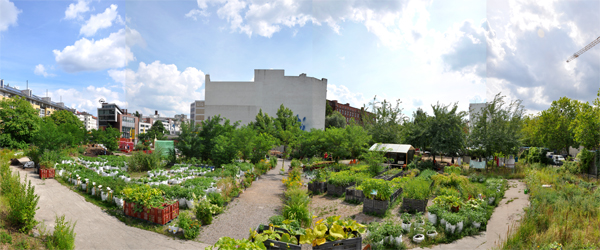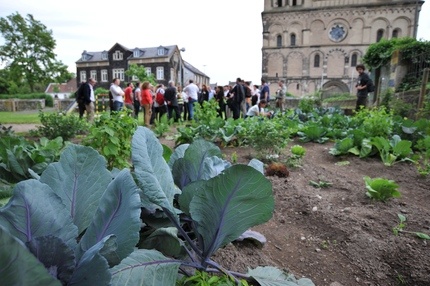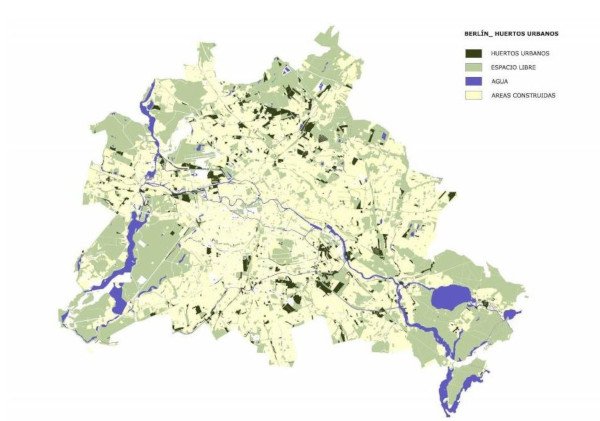Urban Agriculture in Germany. Urban gardens in Andernach and Berlin

Today we will review some of the experiences of urban agriculture in Germany that are being developed today. We have already seen in the category «Orchards around the world» other experiences like these, which try to make cities green in the world, a world that is increasingly gray and polluted, and with more need for food.

Andernach, the edible city. Eatable City Project. A project to fill the city with urban gardens
Andernach is one of the oldest German cities, dating back more than 2,000 years. It belongs to the federal state of Rhineland-Palatinate and is located on the west bank of the Rhine River, about 100 km south of Cologne. It is a medium-sized city, with about 30,000 inhabitants, but that does not prevent it from developing as one of the greenest and most sustainable cities in Europe.
In today’s post we will see one of his initiatives: turning the city’s gardens into orchards. These orchards in Andernach are cultivated by the residents of the different neighborhoods. The purpose is that everyone in the city can have organic food, freshly harvested and much more natural.
In addition, interest in ideas related to urban sustainability, care for food and the environment, the reduction of the carbon footprint and many other benefits of urban agriculture are spread.
In this video you can see the beauty of this green city. Neighbors and project participants also take part, who tell of the always positive experience of having vegetable gardens in the city: they interact, have fun, reduce their stress and have fresh food at the time of cooking.
The garden project in Andernach was launched in 2010. Since then, new cultivation areas have not stopped opening in the city, which already has about 1 hectare of orchards in the center of the city and more than 13 hectares on the outskirts. Hundreds of different varieties of tomatoes, pumpkins, corn, onions, cabbages, fruits are grown… Also useful plants in the garden, such as aromatic herbs and, of course, beneficial flowers mixed with the crops.
But this project, in addition to seeking to improve the quality of life through healthy eating and a greener city, also considers the economic and social well-being of people. That is why it is part of a whole strategy that goes beyond the cultivation of community gardens.
It is the city government that manages the orchards, and is also in charge of training and providing employment to the long-term unemployed, who are in charge of the maintenance and care of the orchards.
Urban agriculture in Germany: Berlin
Since the fall of the Berlin Wall in 1989, many of the abandoned spaces in this city have been converted into gardens and spaces for urbanites to grow their food. These initiatives are linked to the growing concern for the environment and resources.
Since the 1990s, the institutions of the European Union have joined forces to promote a more sustainable world by, among other things, promoting urban greening and organic farming in European cities.
In Berlin there are hundreds of urban gardens on public land that are granted by the Government so that ordinary citizens can grow them and consume their food for periods of 10 or 15 years.
The area dedicated to urban agriculture is more than 10% of the non-built-up area, with urban gardens throughout the city.

In the post Urban Horticulture in Berlin, Sandra showed us the types of orchards in Berlin and some of the best-known experiences of urban agriculture in this German city.
More Urban Agriculture in Germany
Urban agriculture in Germany is booming, as we hope it will continue to happen in other cities around the world.
As they tell us in the video below, there are more and more restaurants that grow food that they then serve to their customers, ecological hotels or Green Hotels in Germany, and many urban gardening projects, such as the internationally known Prinzessinnengarten Project.
I hope you liked this post about Urban Agriculture in Germany and the new urban gardens in Andernach!
We haven’t really been to this country personally, as was the case when we talked about experiences in Spain, England or China on the blog… so hopefully someone who passes by and «knows the land» can tell us first-hand about some of these agricultural initiatives Urban in Germany. Cheers!

![Photo of Summer Flowers: [Names, List, Characteristics and Care]](https://www.complete-gardening.com/wp-content/uploads/2022/08/summer-flowers-names-list-characteristics-and-care-390x220.jpg)
![Photo of Afelandra or Zebra Plant: [Care, Planting, Irrigation and Substrate]](https://www.complete-gardening.com/wp-content/uploads/2022/08/afelandra-or-zebra-plant-care-planting-irrigation-and-substrate-390x220.jpg)
![Photo of Pests and Diseases of Bananas: [Detection, Causes and Solutions]](https://www.complete-gardening.com/wp-content/uploads/2022/08/pests-and-diseases-of-bananas-detection-causes-and-solutions-340x220.jpg)
